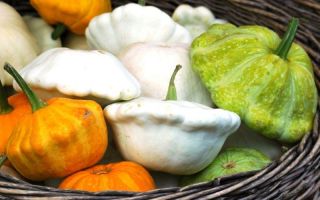Content
- 1 The value and composition of squash
- 2 Useful properties of squash
- 3 What are the benefits of squash for the human body
- 4 The use of squash in traditional medicine
- 5 What is the use of squash for weight loss
- 6 Which is healthier: zucchini or squash
- 7 Limitations and contraindications
- 8 Selection and storage rules
- 9 Conclusion
The benefits and harms of squash for the body are related to each other, the vegetable can bring a beneficial and negative effect. To get the most out of the use, you need to study its properties and rules of application.
The value and composition of squash
An unusual vegetable belongs to the Pumpkin family. It can be found under the second name - dish-shaped pumpkin, because the shape of the fruit is very similar to a saucer. The patisson originated from America, where it was first cultivated, and came to Europe in the 17th century.
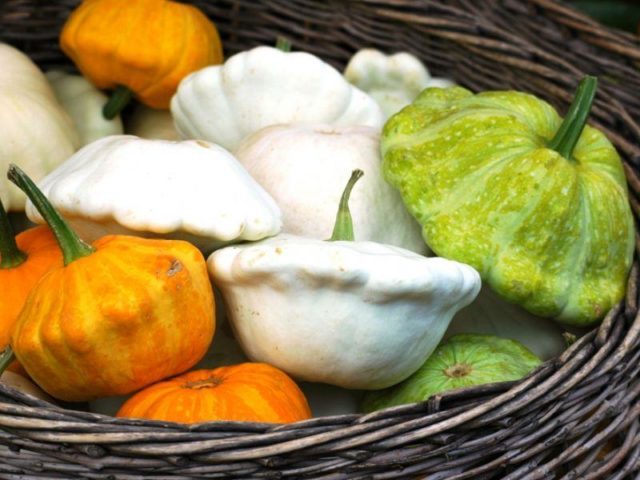
The composition of the nutrients in the product is well balanced - 2.6 g of the total volume of the vegetable are carbohydrates, 1.2 and 0.2 g, respectively, are the share of proteins and fats.
What vitamins are in squash
Dish-shaped pumpkin is highly valued in cooking and home medicine for its rich chemical composition and valuable properties for health. The following substances are present in the pulp of a vegetable:
- vitamin C - about 20% of the daily value;
- vitamin A and beta-carotene - 1.2 and 2.6%, respectively;
- vitamins B6 and B9 - 5.5 and 7.5%;
- vitamins B1 and B2 - 4.7 and 1.7% each;
- vitamin B5 - 5%;
- vitamin K - about 2.8% of the daily value;
- vitamin PP and choline - 3 and 1.5%, respectively.
The fruits of squash contain many minerals. Copper, manganese, potassium and magnesium deserve special mention; they account for between 5.8% and 10% of the daily value. The fruits also contain iron, calcium and phosphorus, zinc and selenium, but their share in the product is relatively small.
In addition to vitamins and mineral salts, squash contains natural sugars, amino acids, and saturated and unsaturated fatty acids.
Calorie content of squash
With a rich chemical composition, the product remains very low in calories. 100 g of pulp contains only 18 kcal, the product is optimal for dietary use.
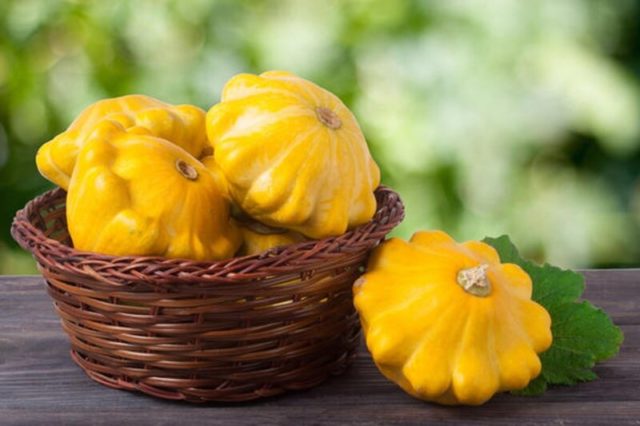
Useful properties of squash
Vitamin vegetable has many beneficial properties, with regular use, it strengthens health and protects the body from many ailments.
In particular, squash:
- is a valuable source of antioxidants, removes free radicals from the body and prevents the development of oncology;
- helps to establish metabolism and improves intestinal peristalsis;
- responsible for the processes of cell renewal and improves the functioning of the nervous system;
- lowers blood pressure and protects the heart muscle from ailments;
- strengthens the immune system due to the high content of vitamin C and increases resistance to colds;
- reduces the risk of strokes and heart attacks, lowers blood cholesterol;
- has a choleretic and diuretic effect;
- has a positive effect on the work of the endocrine system, in moderation, patisson is useful in type 2 diabetes;
- promotes the production of serotonin and thereby improves mood and prevents the development of depression;
- helps fight bacterial processes and inflammation;
- helps to get rid of parasites in the intestines;
- regulates the work of the reproductive system;
- removes excess salts from tissues and joints.
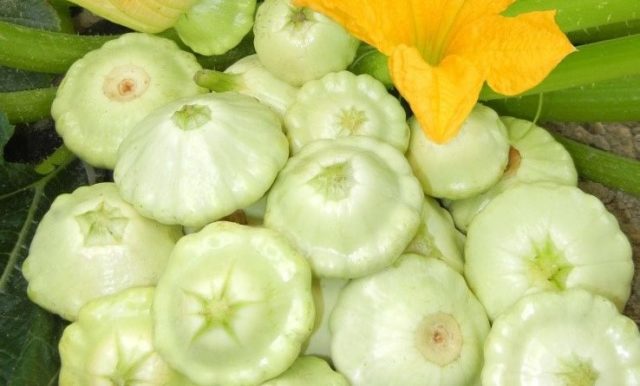
The benefits and harms of juice from squash
Fresh juice squeezed out of vegetable pulp has special medicinal properties. It has a strong diuretic, choleretic and laxative effect, so it is often used to treat constipation and kidney disease. To normalize the intestines, it is enough to consume only half a glass of juice per day, while you can add a spoonful of natural honey to the juice.
When consumed in moderation, the properties of the juice will only be beneficial. However, in case of overdose, side effects can be encountered. Too much drink will cause diarrhea and lead to dehydration.
What are the benefits of squash for the human body
In addition to the listed general valuable properties, the product is of particular benefit to men and women. Including the vegetable in your regular diet can help you avoid common diseases and keep you feeling well.
For men
Men are more susceptible to diseases of the cardiovascular system at a young age. Patissons are useful for them because they strengthen blood vessels and reduce the likelihood of heart attacks, help control cholesterol levels and protect the liver from destruction.
Vitamins in the product have a beneficial effect on the male reproductive system. The properties of the vegetable help maintain a healthy libido, improve the quality of the genetic material. For athletes, use squash is useful to increase endurance, vegetable fruits strengthen the immune system, give additional energy and vigor.
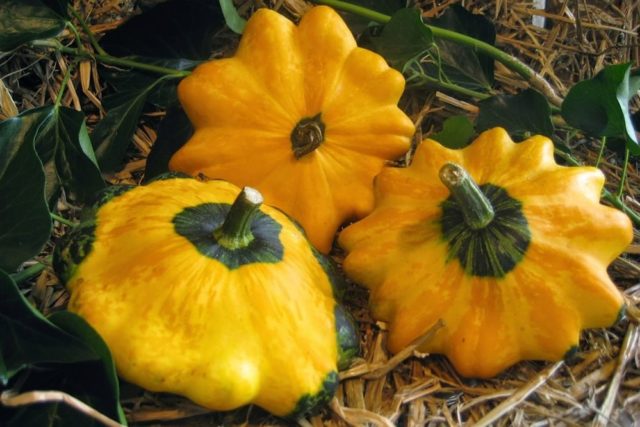
For women
The valuable properties of the product for women are that the vegetable helps maintain lightness and slimness. Dish-shaped pumpkin does not lead to a set of extra pounds, but it regulates peristalsis well and promotes the removal of toxins from the body.
The properties of the vegetable have a positive effect on the nervous system and protect women from stress. Internal and external application of the vegetable helps to keep the skin youthful and attractive, strengthen hair and get rid of acne and blackheads. The antioxidants and minerals in the product help fight the first wrinkles and dry skin of the age.
Is patisson useful during pregnancy
During pregnancy, women often suffer from constipation and the accumulation of excess fluids. Patissons in such a situation will be of particular benefit - they will help get rid of edema and improve digestion. You can also eat vegetables to strengthen the immune system, as well as to raise the mood, dish pumpkins reduce stress and eliminate hormonal imbalances. Squash will help a woman maintain the attractiveness of skin and hair, and accelerate cell renewal.
Since the product contains almost all the B vitamins, the fruits of the dish pumpkin will be useful for the developing fetus. They will protect the baby in the womb from congenital diseases.
In the presence of individual intolerance, squash can have a negative effect. Therefore, it is especially important for a pregnant woman to make sure in advance that vegetables will not be harmful.
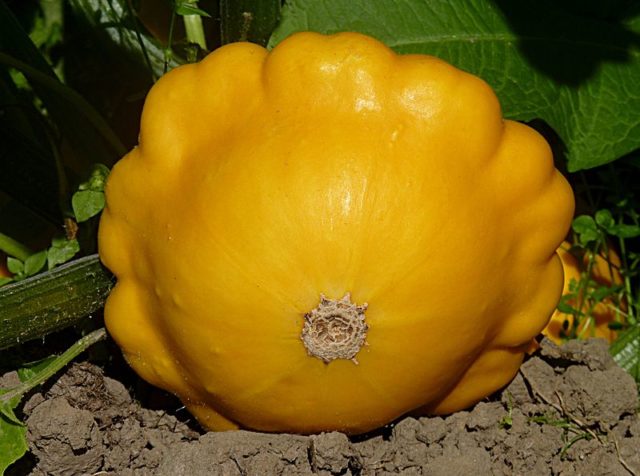
Is it possible for a nursing mother to squash
During lactation, dish-shaped pumpkin is very useful, it saturates the woman's body with vitamins, helps restore the figure after childbirth, removes toxins and toxins from the cells. Against the background of eating a vegetable, the quality of breast milk improves. In babies, an allergy to the product is rare, therefore, it can be introduced into the diet of a young mother immediately after childbirth.
When using squash with HS, it must be borne in mind that it has strong diuretic properties. It should be consumed in moderation and not every day so that the vegetable does not provoke dehydration.
At what age can squash for children
Patissons are ideal for baby food, they rarely cause allergies, but they contain a lot of vitamins, minerals and fiber. Vegetables can help prevent constipation in children, and their benefits lie in the fact that they increase the immune system and improve the mental activity of the child.
You can give squash to children from the age of 6 months, along with the first complementary foods. For the first time, you need to offer a product to a child in the form of mashed potatoes from boiled pulp.
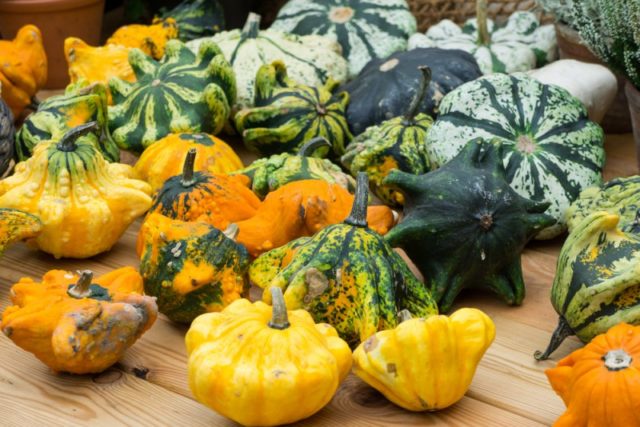
The use of squash in traditional medicine
The beneficial properties of the product are highly regarded in home medicine. The recipes for treatment use both grated pulp and vegetable juice, as well as its seeds.
With kidney disease
In case of impaired kidney function, the following remedy helps:
- squeeze 100 ml of juice from fresh squash;
- add 10 g of natural honey;
- stir well.
You need to use the product 3 times a day in between main meals.
For constipation
Squash juice is beneficial for sluggish digestion. Traditional medicine recommends simply squeezing 100 ml of fresh juice from a vegetable and drinking it shortly before eating, once a day. The beneficial substances in the juice will improve the digestibility of food and help get rid of the problem of constipation.
With edema
With a tendency to edema, a good effect is brought by the powder from the seeds of vegetable fruits. 100 g of seeds must be peeled and chopped in a blender or coffee grinder. Take a healing powder 20 g three times a day, shortly before meals. The powder should be washed down with a glass of clean water.
With varicose veins
Drinking dish-shaped pumpkin juice is useful for varicose veins and thrombophlebitis, the drink is consumed three times a day on an empty stomach, 2 large spoons.
Also, with varicose veins, it is useful to lubricate the legs with vegetable juice or apply compresses with grated pulp. They need to be kept for 20 minutes, and the entire course of treatment continues for 3 weeks.
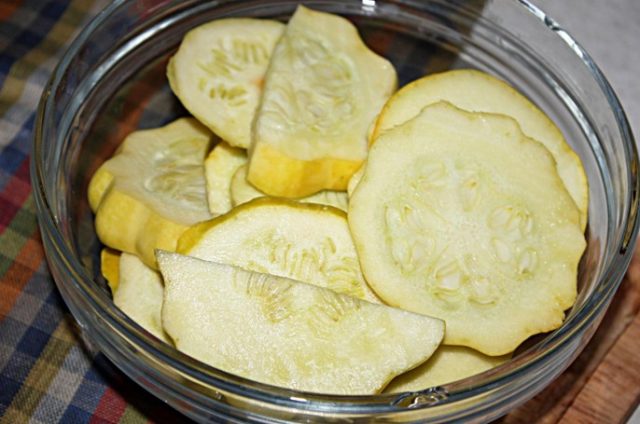
The use of squash in cosmetology
The high content of B vitamins in the vegetable, as well as the presence of antioxidants in its pulp, have a beneficial effect on the skin. When used externally, dish pumpkin allows you to regulate the fat content of the epidermis, rejuvenate the skin and get rid of fine wrinkles.
Mask for oily skin
Against the increased fat content of the epidermis, acne and acne, such a mask helps:
- the pulp of the vegetable is grated in the amount of 2 large spoons;
- add 1 large spoonful of steamed oatmeal;
- mix the mask and apply for 20 minutes on a washed face.
It is recommended to repeat the procedure twice a week, in which case the effect of the application will become noticeable very quickly.
Moisturizing mask
For dry skin prone to irritation, the following remedy will be beneficial:
- 1 large spoonful of squash juice is mixed with egg yolk;
- add 5 drops of olive oil;
- apply the mixture to the face and leave for 15 minutes.
Oil and yolk have a strong emollient effect, while vegetable juice nourishes the epidermis and stimulates the rejuvenation process.
What is the use of squash for weight loss
In dietetic nutrition, the product is valued primarily for its high fiber content. It helps to quickly cleanse the intestines, remove accumulated toxins and toxins from the body, and normalize metabolic processes.
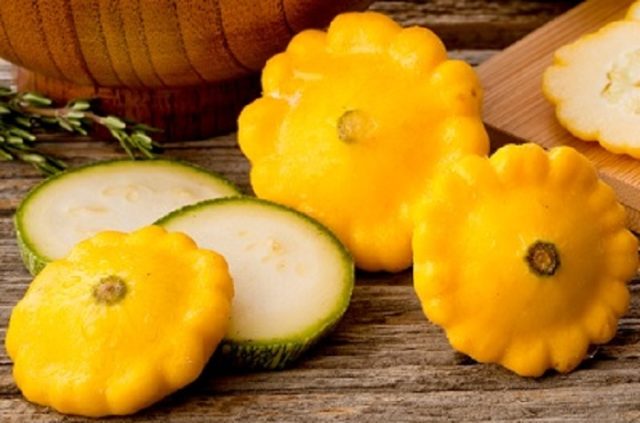
The vegetable also benefits from the fact that it improves the absorption of proteins and sugars and prevents the accumulation of fatty deposits. Patisson in the diet on a diet has a tonic effect, gives vigor and energy, helps to get rid of edema due to its diuretic properties.
Which is healthier: zucchini or squash
Squash and squash belong to the same family and are very similar in composition. But they also have fundamental differences:
- Zucchini contain more water, their pulp is juicy and porous, in contrast to the denser pulp of squash.
- Zucchini can be eaten raw, but squash needs to be boiled.
At the same time, there are still more useful substances in the pulp of squash, for example, more pyridoxine, niacin and folates are included in the dish pumpkin. Squash also have a more interesting and rich taste, in the processed form they a little resemble mushrooms.
Both vegetables bring health benefits, but the squash has a little more valuable properties, although it must be processed more carefully before use than zucchini.
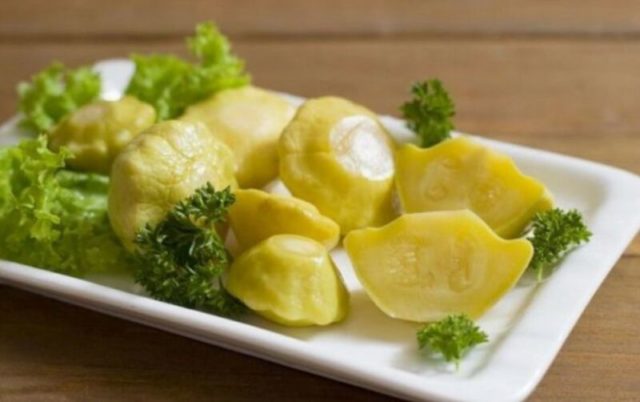
Limitations and contraindications
Patisson is a healthy vegetable with a minimum of contraindications. However, even he has certain prohibitions to use.
It is not recommended to eat vegetable pulp:
- with hypotension;
- in acute digestive disorders - diarrhea and nausea;
- with stones in the kidneys and gallbladder;
- with exacerbations of peptic ulcer and pancreatitis;
- with individual allergies.
With extreme caution, you need to approach the use of canned vegetables. In this form, squash cannot be used by children under 10 years of age, as well as people suffering from diabetes and intestinal ailments.
Selection and storage rules
When choosing vegetable fruits, you need to pay attention to:
- mass - the squash should be weighty for its size;
- dimensions, it is best to take medium-sized fruits, large squash contains more seeds, and their flesh is more fibrous;
- color, squash are white, green and yellow, but in any case, the color should be uniform, without spots, too light areas and traces of decay.
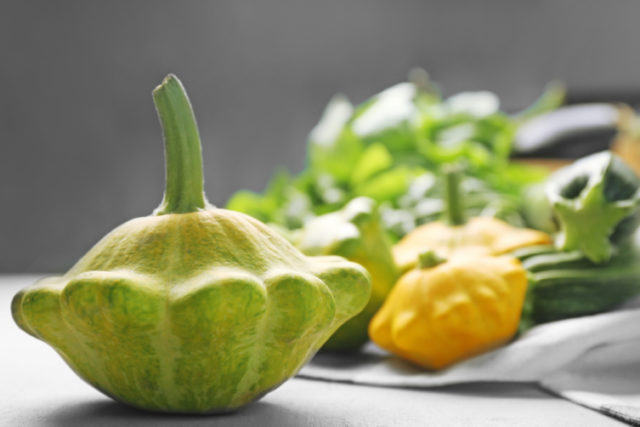
Store vegetables in the refrigerator on the bottom shelf. But even in such conditions, the fruits retain their beneficial properties and taste for no longer than 5 days, so it is better to cook them immediately after purchase.
Conclusion
The benefits and harms of squash for the body are ambiguous, but mainly vegetables have a beneficial effect on health. When using it, you need to remember that squash is not eaten raw, they must be boiled, stewed or fried.

